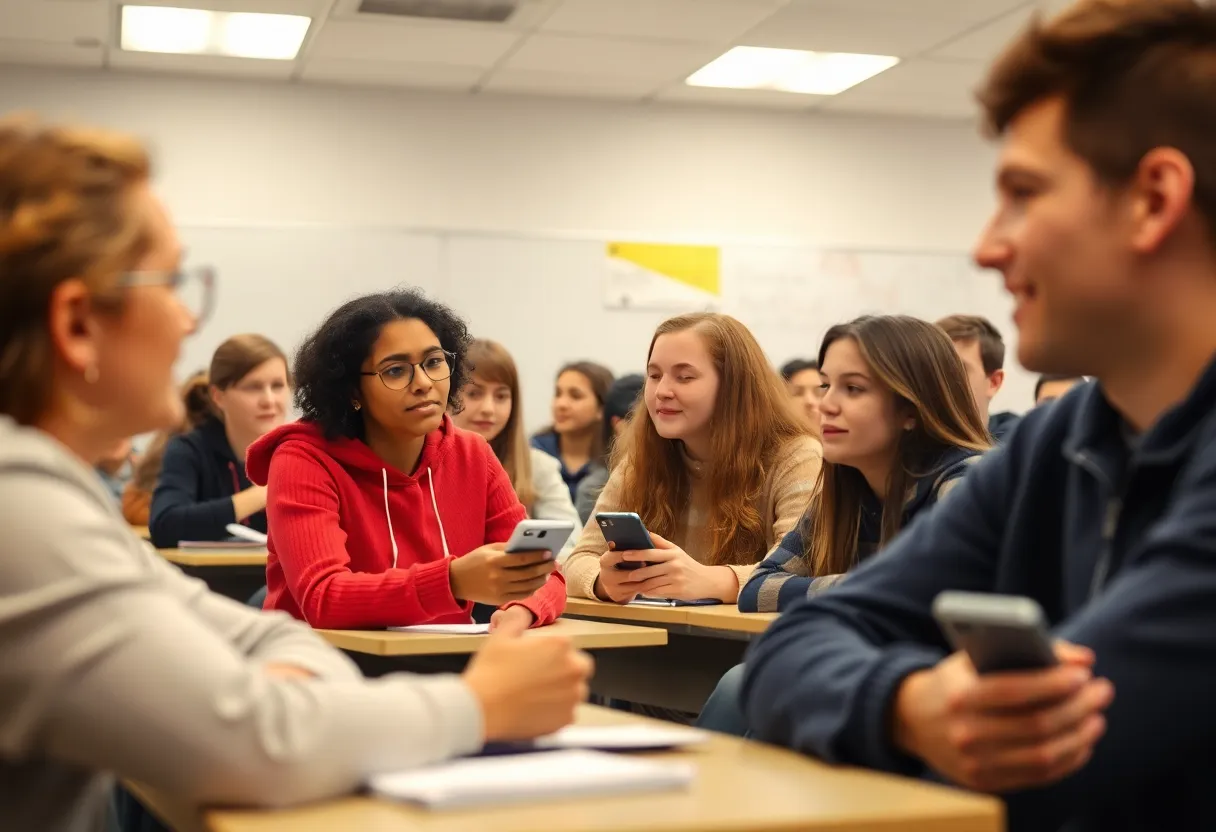News Summary
In response to rising distractions, Newton, Massachusetts is enhancing its cell phone restrictions in schools. Following the success of a policy at F.A. Day Middle School, which drastically reduced phone-related incidents, the new state law will mandate similar regulations across public schools. The initiative aims to improve student engagement and academic performance, with various strategies considered to manage screen time amid concerns over mental health linked to social media usage. Other states have adopted similar measures, reflecting a growing trend to limit cell phone use in educational settings.
Newton, Massachusetts is strengthening its restrictions on cell phone use in schools in response to increasing distraction problems among students. The trend follows the successful implementation of a cellphone policy at F.A. Day Middle School, which significantly reduced phone-related incidents and improved student engagement.
In recent years, teachers at F.A. Day Middle School reported that students often had their cell phones out during classes, as well as in hallways, bathrooms, and lunchrooms. Concerned about the impact of phone usage on education, Principal Jackie Mann established a system over three years ago that requires students to place their phones in special pouches at the start of each school day. This initiative led to a remarkable decline in phone-related issues, from over 400 incidents to just 15 in one year.
As a result of this policy, teachers observed considerable improvements in student interaction and engagement. In the absence of phones, students reported feeling more focused and connected to their peers. Improvements in academic and social performance were noted, with students emphasizing the benefits of being free from phone distractions.
Starting in 2026, a new Massachusetts law will mandate all public schools to impose restrictions on cell phone use. Schools will have the flexibility to choose their implementation methods, which may include locking phones away or establishing clear usage guidelines.
Experts, including child psychologists, indicate that such restrictions can boost academic performance while reducing disruptive behaviors in classrooms. Although some parents initially expressed concerns about their children’s ability to communicate during emergencies, many have found their worries soothed as they adapted to the new policy.
Moreover, parents have reported that the cellphone ban has assisted them in reinforcing rules about device usage at home. The success of F.A. Day Middle School’s policy has resonated across the state, with increasing legislative proposals aimed at regulating student access to smartphones during school hours. There are various strategies being considered statewide for managing student screen time amid rising mental health concerns linked to social media use among youth.
Several other states have already enacted similar restrictions. At least eight states, including California and Florida, have introduced measures designed to limit cellphone use in educational settings. In Massachusetts, other institutions like Ipswich High School and Boston Public Schools have followed suit, implementing their own cellphone bans and reporting enhanced student interactions and improved school culture.
An important link has been established in several studies between excessive social media usage and heightened anxiety and depression symptoms among adolescents. This connection has fueled calls for restrictions on smartphone use to safeguard students’ mental health. Massachusetts legislative discussions are increasingly recognizing the need to address the dangers of social media and reduce overall screen time for students.
As schools navigate the complexities of technology use, the emphasis remains on fostering a conducive learning environment free from distractions. With the anticipated enforcement of the cellphone policy statewide, educators are hopeful that the positive changes witnessed in Newton will inspire similar outcomes in schools across Massachusetts.
Deeper Dive: News & Info About This Topic
HERE Resources
Hamilton Musical Returns to Boston
Severe Storms Cause Destruction in Massachusetts
Massachusetts Senate Approves Statewide Cell Phone Ban in Schools
Mixed Reactions to Proposed Cellphone Ban in Boston Schools
Massachusetts Considers Statewide Cellphone Ban in Schools
Additional Resources
- WCVB: New Personal Electronics Policy in Newton
- Wikipedia: Cell Phone Usage in Schools
- Boston Globe: Massachusetts Cell Phone Ban
- Google Search: Impact of Cell Phone Use on Students
- Axios: Massachusetts Schools Cellphone Bans
- Google Scholar: Smartphone Restrictions in Schools
- Boston.com: Newton Mayor Not Running for Re-Election
- Encyclopedia Britannica: School Cellphone Policies
- CBS News: Avoiding Mass Pike Weekend Bridge Work
- Google News: Massachusetts School Policies
Author: STAFF HERE BOSTON WRITER
The BOSTON STAFF WRITER represents the experienced team at HEREBoston.com, your go-to source for actionable local news and information in Boston, Suffolk County, and beyond. Specializing in "news you can use," we cover essential topics like product reviews for personal and business needs, local business directories, politics, real estate trends, neighborhood insights, and state news affecting the area—with deep expertise drawn from years of dedicated reporting and strong community input, including local press releases and business updates. We deliver top reporting on high-value events such as Boston Marathon, Head of the Charles Regatta, and Boston Harborfest. Our coverage extends to key organizations like the Greater Boston Chamber of Commerce and Associated Industries of Massachusetts, plus leading businesses in finance, biotech, and insurance that power the local economy such as Fidelity Investments, Biogen, and Liberty Mutual Insurance. As part of the broader HERE network, we provide comprehensive, credible insights into Massachusetts's dynamic landscape.





